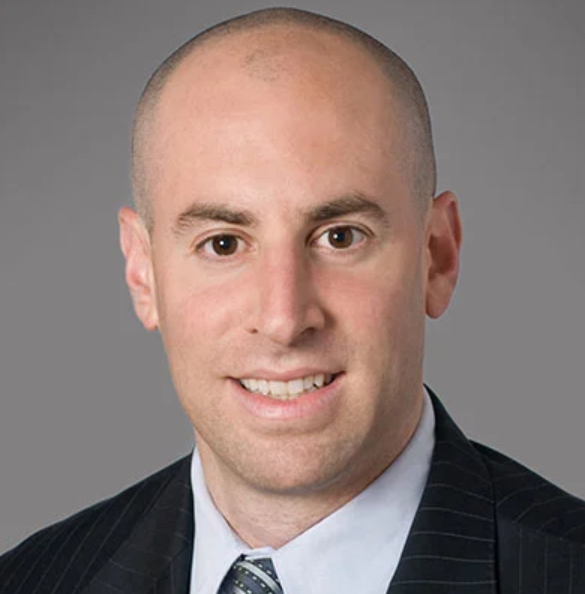By Roy Strom
It all started in mid-June when Joshua Sussberg got a phone call from David Brosgol, general counsel for cryptocurrency exchange Voyager Digital.
Sussberg, a partner at Kirkland & Ellis in Manhattan, had never met Brosgol and had zero experience with crypto—he’d never even owned Bitcoin.
The troubled company was in the market for a restructuring lawyer. Sussberg, 44, is at or near the top of most lists.
First, he had some questions.
“What is Voyager Digital, and what do you do?” Sussberg said he asked. “I got a crash course in crypto.”
That was the start of an education that at this point might give Sussberg enough credits for an advanced degree in the murky world of cryptocurrency. In an industry swarming with lawyers, Sussberg has emerged as one of the busiest and potentially most important.
He represents three of the four major crypto exchanges that have filed for bankruptcy protection—Voyager, Celsius Network, and BlockFi—which together held billions of dollars in customer assets before they halted withdrawals. Sussberg’s work will help answer tricky first-time legal questions while determining how much, if anything, customers get back.
He’s also gunning to represent creditors of FTX, the failed exchange whose founder, Sam Bankman-Fried, now faces criminal charges. The committee is set on Monday to hear pitches from lawyers who will help a judge shape payout plans.
It’s not the first time Sussberg has become the go-to bankruptcy lawyer for an industry in distress. He and a team of 200-plus Kirkland & Ellis restructuring lawyers led the charge in a surge of oil and gas bankruptcies in 2016 and later Covid-era retail filings from J.C. Penney Co., Pier 1 Imports, and Nieman Marcus.
“A lot of times you’re dealing with executives and boards who may have never been in a restructuring situation. But with Josh, it’s calming,” said Mike Zendan, who was the top lawyer at three companies Sussberg represented in restructurings. “It’s confidence that this guy knows his crap.”
Sussberg made his way to the top of the bankruptcy bar with a reputation for relentless hustle, trusted-if-kitschy courtroom performances, and a borderline obsession with his job. After eight months battling a rare form of cancer in 2016, he returned to work earlier than doctors advised, forcing him to leave bankruptcy hearings to receive chemo treatments while still wearing a full suit.
Two weeks after Sussberg took Voyager’s call, Patrick Nash—a Kirkland partner in Chicago—received an inquiry from an independent director at Celsius Network. The crypto exchange was among several reeling from the crash of the TerraUSD stablecoin and its companion token LUNA.
Kirkland has built a vast network of industry players, which Sussberg often relies on to find new cases. He soon got the job as lead bankruptcy lawyer for Celsius.
Last month, Sussberg was referred to BlockFi’s board by former Kirkland partner Jon Henes. Sussberg became co-lead counsel in the company’s own bankruptcy case, alongside BlockFi’s longtime lawyers at Haynes & Boone.
“He’s amazing at figuring out who knows who and how can he get in front of someone,” Henes said.
The crypto cases are already generating big fees for Kirkland, the world’s largest law firm by revenue, where partners in 2021 took home an average $7.4 million in profit.
Kirkland billed nearly $25 million on the Voyager and Celsius cases in the first three months working on their cases, according to court documents. Fees for the BlockFi work haven’t yet been disclosed. Sussberg charges $1,845 an hour, roughly in-line with other top bankruptcy lawyers but below the highest Big Law hourly rates, which have surged past $2,000.
Kirkland has emerged as the leading bankruptcy firm in recent years. It represented 23 of the 57 largest public bankruptcies in 2020, according to a database compiled by law professor Lynn LoPucki. That marked the highest market share for a single firm in at least 40 years.
Sussberg was born in Cleveland, Ohio, where his father ran a custom home-building company. It closed during the early 1990s recession and the family moved to South Florida when Sussberg was 15 years old.
He headed to college at Syracuse University, initially dreaming of a job as an ESPN “SportsCenter” anchor. Put off by the early hours and small markets that define early sports anchor careers, he opted instead for Cardozo Law School in New York.
As a first-year associate at Weil Gotshal & Manges, he rotated through four practice areas: litigation, corporate, real estate, and restructuring.
“I absolutely loved the pace, the energy, and the blend between the transactional world and court,” he said of bankruptcy work. “And they said I’d get into court early, which was true. I was arguing motions my first year.”
The bankruptcy process has been criticized for shielding executives from personal liability, as in the case of opioids manufacturer Purdue Pharma, and being used to short-circuit mass tort lawsuits, as in the 3M litigation.
Sussberg, who joined Kirkland in 2007, comes across as a true believer in the system. He draws motivation from what he views as a chance to save jobs and help steer executives out of tough spots.
The toughest challenge of his professional career started when retailer Toys R Us filed for bankruptcy in late 2017. Sussberg and the company’s executives initially said the toy store chain could survive a court restructuring. They later blamed dismal sales for breaching a loan, which lead to the company liquidating.
Creditors sued the executives, alleging the initial plans were too optimistic. The suit ended in an undisclosed settlement in October.
The Toys R Us liquidation cost more than 30,000 jobs, prompting criticism from worker advocates and lawmakers like Sen. Elizabeth Warren (D-Mass.). They accused private equity firms KKR & Co., Bain Capital, and Vornado Realty Trust of skirting $75 million in severance pay for the workers. KKR and Bain later agreed to put up $20 million toward the severance.
Sussberg, who’s firm raked in $56 million in fees working on the Toys R Us bankruptcy, said the outcome is still “particularly hard” to deal with.
Knowing the result, he also regrets singing the Toys R Us theme song at the company’s initial bankruptcy hearing—a moment that competitors in the bankruptcy world still roll their eyes at.
“I did sing, and I shouldn’t have,” he said.
Still, his performance in the case won the respect of Dave Brandon, then-CEO of Toys R Us. When Sussberg spots a company in distress, he regularly texts Brandon, asking if he can make an introduction to a key player. That’s helped him land work for retailers Pier 1 and Macy’s, among others.
“He’s only done that about 15 times with me,” Brandon joked. “I’m a firm believer that if a CEO is in that situation and they take a meeting with Josh Sussberg, they’re going to hire him.”
“He’ll come into that room and know more about your balance sheet and your company than you could ever imagine.”
Even if he’s done with singing, Sussberg typically tries to make an impression on judges at first-day hearings with colorful court performances.
During the first hearing for fashion house BCBG Max Azria Group LLC, Sussberg presented Judge Shelley Chapman with a digital fashion show—flicking through photos of the designer’s clothing on a PowerPoint.
“He did his best to actually appear to know what he was talking about in terms of the fashion aspects of the clothing he presented,” Chapman, now a partner at Willkie Farr & Gallagher, said in an interview. “Some of it is showmanship, but there’s definitely a level at which it helps get the case off to a good start, create context, and focus everybody’s attention in the middle of what’s usually a highly tense and fraught first couple of moments in the case.”
Sussberg helped another retailer, J.C. Penney, avoid liquidation by pushing through a contentious $900 million financing plan that some lenders called “predatory.” The plan was ultimately approved by a judge, and J.C. Penney emerged from bankruptcy after splitting its real estate assets into a creditor-owned business and selling its operating company to two landlords with a financial interest in the company’s survival.
Sussberg’s role in the crypto cases is to recover assets for the exchanges and then decide how to dole them out. The earliest fights have been over what types of customer accounts will be returned to end users.
Customers have been sending letters to the judges handling the cases, explaining their losses and pleading for the return of their cash. Some have banded together to hire lawyers—often finding them on Twitter—as they search for answers about an unfamiliar process.
“Voyager wants to walk away with all of our hard-earned money, life savings, people’s disability money etc. and we walk away with nothing,” one customer, who said she lost $25,000, wrote. “Please don’t let the rich walk away richer and the poor walk away losing.”
Sussberg said he wants to quickly return to customers as much money as possible. But the cases have already sparked disputes between customers and exchanges that read their contracts as giving them ownership of the users’ crypto. How those fights are resolved could inform how digital assets are treated in other cases.
“We want to instill confidence and show people we’re not about running out long cases and trying to be greedy and litigate for no reason,” Sussberg said. “We want to put money back into these customers’ pockets.”
David Adler, a lawyer at McCarter & English who represents a group of Celsius creditors, said Kirkland lawyers appeared to be moving to end the case quickly by pushing to sell the defunct exchange’s assets.
“They’re trying to figure out the rights of the different groups in the property that’s to be distributed,” Adler said.
Sussberg’s next fight is against FTX.
The failed exchange won an auction to purchase Voyager assets before Bankman-Fried’s flame-out. Voyager has since found another buyer for those assets, Sussberg said, to be announced shortly.
Sussberg wants to get to the bottom of what Bankman-Fried knew about FTX’s finances when he offered to purchase Voyager and made loans to BlockFi that gave the now-indicted 30-year-old an option to purchase the rival exchange. FTX is one of BlockFi’s biggest unsecured creditors, with a $275 million claim. The FTX bankruptcy could take years to play out.
“Did he have an issue even before he went out there and launched himself as the savior of the market? Because if he did, that’s a real problem,” Sussberg said of Bankman-Fried.
Sussberg will soon find out if he will also win the role as lead lawyer to the FTX creditors’ committee.
When he goes before the committee Monday, he’ll have a ready-made pitch: In six months, he’s gone from crypto newbie to having a behind-the-scenes look at some of the industry’s biggest crashes.
“We understand everything that’s happened,” he said.
To contact the reporter on this story: Roy Strom in Chicago at [email protected]
To contact the editors responsible for this story: Chris Opfer at [email protected]; John Hughes at [email protected]
To read more articles log in.
Learn more about a Bloomberg Law subscription.




